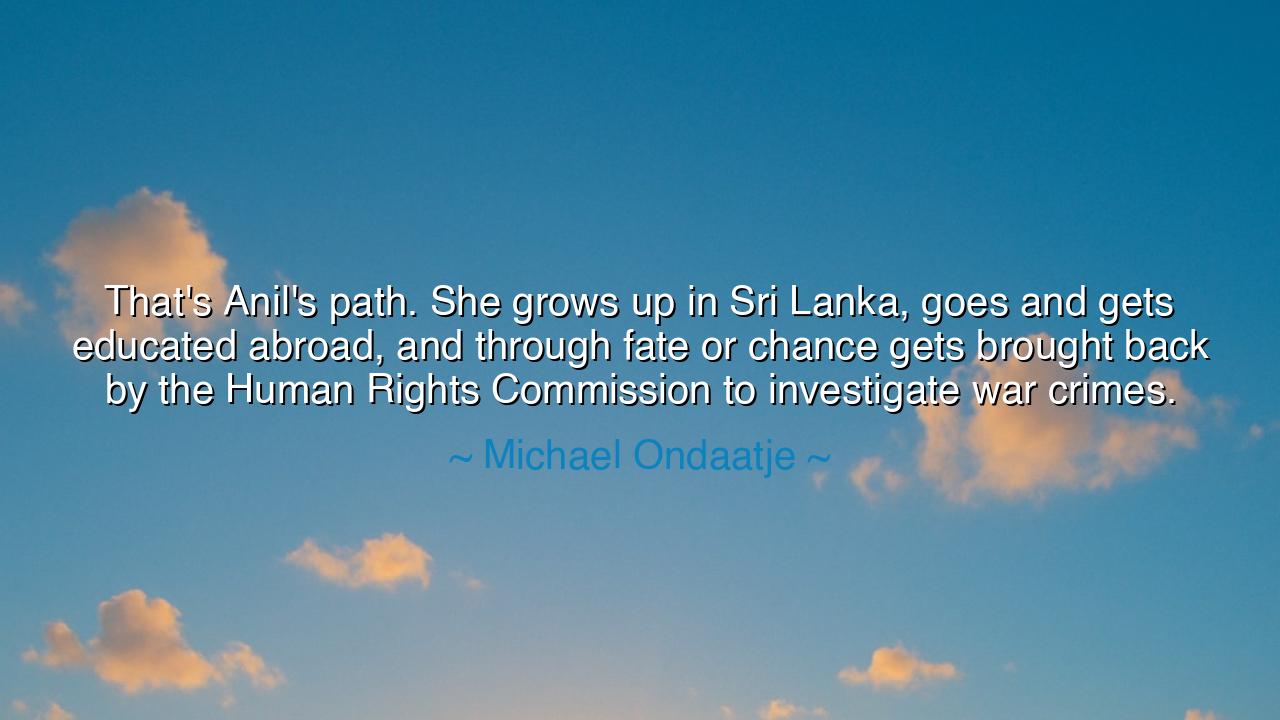
That's Anil's path. She grows up in Sri Lanka, goes and gets
That's Anil's path. She grows up in Sri Lanka, goes and gets educated abroad, and through fate or chance gets brought back by the Human Rights Commission to investigate war crimes.






In the unfolding story of life, there are moments when the path of an individual seems guided by forces beyond their control. Michael Ondaatje's words, “That's Anil's path. She grows up in Sri Lanka, goes and gets educated abroad, and through fate or chance gets brought back by the Human Rights Commission to investigate war crimes,” reveal a truth about the nature of destiny — how it is often shaped by external forces, yet ultimately depends on the choices and actions of the individual. Anil’s journey is not one of a linear, predetermined fate, but one that weaves together opportunity, education, and humanity’s greater struggles, creating a unique path that transcends time and borders.
The ancients understood well the notion that one’s life path is both shaped by external forces and personal agency. In the Iliad, the Greek hero Achilles is caught between the demands of fate and his own desires. The gods weave his destiny, but it is Achilles’ choices — his decision to fight in the Trojan War, his quest for glory — that ultimately define his path. Similarly, Anil’s story, as described by Ondaatje, is not merely the result of random chance, but of a series of decisions and events that coalesce to create a path that she could never have fully predicted. Just as Achilles was bound to his fate, so too is Anil bound by the circumstances of war, education, and the call to action in the face of immense human suffering.
Consider the life of Socrates, the ancient philosopher who, though born into relative obscurity, found himself at the crossroads of personal choice and social responsibility. Socrates did not follow the traditional path of his peers, nor did he seek personal gain; instead, he followed a path of truth and moral conviction, one that would ultimately lead to his trial and death. Like Anil, Socrates’ life was shaped not by the predictable forces of his society, but by his response to the deeper questions of life, justice, and the human condition. Socrates’ path was one of self-exploration, seeking knowledge that transcended the bounds of his immediate experience, and, in doing so, influencing the future of Western thought.
In a more modern context, consider the life of Nelson Mandela, who was not born to be a leader of nations, but whose personal experiences and moral convictions led him to the forefront of the fight against apartheid in South Africa. Mandela’s path, much like Anil’s, was shaped by forces larger than himself, yet his ability to adapt, learn, and stand firm in his convictions allowed him to become a beacon of hope and reconciliation for millions. Though his path was fraught with challenges, including imprisonment, it was his choices — his refusal to succumb to the dehumanizing forces of oppression — that defined his ultimate impact. Like Anil, Mandela responded to the call of humanity and justice, shaping a future that was not written for him but created through his actions.
Ondaatje’s words about Anil’s path also hint at the powerful role of education in shaping one’s journey. Just as Anil is educated abroad, many throughout history have traveled and studied beyond their native lands, seeking wisdom and knowledge that would not only transform their own lives but also enable them to contribute to the greater good. Take the example of Albert Einstein, who, though born in Germany, immigrated to the United States and, through his scientific discoveries, changed the course of history. Education, as Ondaatje suggests, is not just about acquiring knowledge, but about preparing oneself for the opportunities that fate might bring — to serve humanity, to right wrongs, and to make a difference.
The lesson here is one of openness and readiness — that life’s greatest opportunities often come unexpectedly, shaped by the convergence of events and decisions. Anil’s path reminds us that we must remain receptive to the world around us, embracing the chances that come our way, even when they seem unpredictable or outside our control. Just as Mandela responded to the call of justice in South Africa, or Einstein answered the call of scientific discovery, we too must be prepared to take action when fate and opportunity align. This means being open to change, adaptable to circumstances, and brave enough to follow the path that calls us, no matter where it may lead.
In practical terms, the lesson is to pursue knowledge and growth without being bound by the limits of your immediate surroundings. Travel beyond your borders, both physically and intellectually, and embrace the experiences that will shape your character. Know that your path, like Anil’s, may not be clear at the outset, but through learning, open-mindedness, and service to humanity, you will find that the destiny you create is far richer than the one you might have planned. Like the heroes of old, make the most of your opportunities, for the chance to contribute meaningfully to the world is a gift that comes not by accident, but through preparation, action, and a heart willing to serve.






AAdministratorAdministrator
Welcome, honored guests. Please leave a comment, we will respond soon